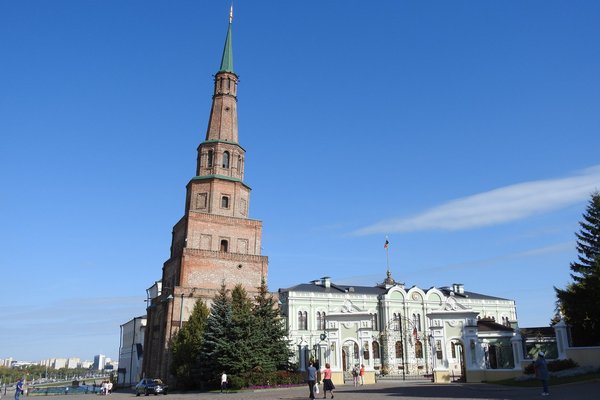Russia
Kazan Kremlin
The Historic and Architectural Complex of the Kazan Kremlin is the chief historic citadel of Tatarstan which shows historical continuity and cultural diversity.
A fortified Islamic settlement since the 10th century, it was further developed in the next centuries until being conquered by Ivan the Terrible who turned it into the Christian See of the region. The Kremlin includes several religious, political and administrative buildings in a fusion of Tatar and Russian architectural styles.
Community Perspective: Kazan is a handsome city with plenty of interest (and controversy, as Solivagant explains). The place has become much more tourist-friendly since about 2016, as is reflected in the reviews. Notable sights include the 16th-century Annunciation Cathedral, the leaning Söyembikä Tower and the 21st-century Qolşärif Mosque.
Site Info
Official Information
- Full Name
- Historic and Architectural Complex of the Kazan Kremlin (ID: 980)
- Country
- Russia
- Status
-
Inscribed 2000
Site history
History of Kazan Kremlin
- 2000: Inscribed
- Inscribed
- Type
- Cultural
- Criteria
- ii
- iii
- iv
Links
- UNESCO
- whc.unesco.org
- Official
-
- kazan-kremlin.ru — Kazan Kremlin
All Links
UNESCO.org
- whc.unesco.org — whc.unesco.org/
Official Website
- kazan-kremlin.ru — Kazan Kremlin
News Article
- May 5, 2008 russia-ic.com — Kazan Kremlin under threat because of building development
Community Information
- Community Category
- Secular structure: Military and Fortifications
Travel Information
Kazan Hotspot
Recent Connections
-
Trans-Siberian Railway
Kazan Station
-
Russian Revival architecture
Bell tower of the Epiphany Cathedral
-
Perfect Inscriptions
2000
Connections of Kazan Kremlin
- Individual People
-
-
Ivan the Terrible
conquered it -
Ibn Battuta
-
- Geography
-
-
Volga Basin
-
Trans-Siberian Railway
Kazan Station
-
- Trivia
-
-
Minority communities
Tatars
-
- History
-
-
Sieges and Battles
Russians 1552 -
Located in a Former Capital
Khanate of Kazan (1438-1552) -
Golden Horde
"Built on an ancient site, the Kazan Kremlin dates from the Muslim period of the Golden Horde and the Kazan Khanate." -
Tatars
Kazan Khanate -
Neolithic age
"Today, the number of monuments of the Mesolithic (7th-5th millennia BC)and Neolithic ages (4th--3rd millennia BC) in the territory and in the suburbs of the present-day Kazan is approaching ten." (see link)See real-kremlin.ru
-
- Architecture
-
-
Brick architecture
Syuyumbike Tower -
Russian Revival architecture
Bell tower of the Epiphany Cathedral
-
Gold Surfaces
Golden dome of Annunciation Cathedral -
Architectural design competitions
"A special case in the Kremlin complex is the mosque of Koul Charif. There is no exact information about the original mosque, destroyed when the city was captured by Ivan the Terrible in 1552. The mosque can therefore be seen as a new building. The project for construction of a mosque was chosen at the architectural competition founded by the government. The approved project adheres to traditional vision of the spatial concept and decor; however, modern materials and structural systems are applied." (Official description) -
Conical roofs
-
- World Heritage Process
-
-
Developed since inscription
Kul Sharif Mosque inside the Kremlin (2005) -
Perfect Inscriptions
2000
-
- Religion and Belief
-
-
Legends and Folk Myths
"As the legend goes, the Kazan queen Söyembikä threw herself down from the highest tier [of Söyembikä tower], hence the name." Wiki -
Multiple Religions
Crit iv - "showing the impact of Islam and Christianity." -
Cathedrals
Annunciation Cathedral (1554-62), the only 16th-century Russian church to have six piers and five apses -
Notable mosques
Kazan Qol Sharif - the only 21st Century building identified in a nomination
-
- Human Activity
-
-
Hermitage Museum
dependency at the Junker School in the Kremlin
-
- Constructions
-
-
Leaning Tower
Söyembikä Tower -
Tunnels
under The Secret Passage Tower -
Mausolea
The remains of 15th and 16th centuries mausoloea were recovered at Syuyumbeki Tower. -
Walled cities
-
Moats
"Kazan was a pre-Mongol Bulgar city with fortified trading settlement, surrounded by moats, ramparts and stockade." (OUV)
-
- Timeline
-
-
Built in the 16th century
"The Kazan Kremlin is a medieval fortress; its inner space ....contains buildings dating from the 16th to the 19th centuries, with remains of the 10th-16th century fortifications and structures." (AB). The Kremlin "on view" was constructed after the taking of Kazan by Ivan the Terrible's army in 1552 - in particular, the fortifications and the Cathedral complex are 16C.
-
- WHS Hotspots
-
-
Kazan Hotspot
In the city center
-
- Science and Technology
-
-
Libraries
Qolsarif Mosque Library
-
News
- russia-ic.com 05/05/2008
- Kazan Kremlin under threat because…
Recent Visitors
Visitors of Kazan Kremlin
- Adrian Turtschi
- Alexander Barabanov
- Alexander Lehmann
- A. Mehmet Haksever
- Artur Anuszewski
- Atila Ege
- AYB
- Bram de Bruin
- Carlo Sarion
- Cluckily
- Csaba Nováczky
- CugelVance
- disnsam
- Els Slots
- Emili Xaus
- Evgenii
- Fan Yibo
- fedemarch92
- FK
- George Gdanski
- Gernot
- giloudepuertorico
- Harald T.
- Harry Mitsidis
- Iain Jackson
- Ivan Rucek
- Jakubmarin
- Janos
- Jarek Pokrzywnicki
- Javier
- Jonas Kremer
- KarenBMoore
- Kasper
- Knut
- Lindaflat
- Luis Filipe Gaspar
- manman2411
- marcel staron
- Marcobrey
- Martin
- Martina Rúčková
- Michael Novins
- Mikhail
- Miloš Tašković
- MMM
- Nihal Ege
- Onkrad
- Patrik
- Pink Bunny
- puessergio
- Reza
- Roger Enarsson
- Roman Bruehwiler
- Sergio Arjona
- sibariam
- Solivagant
- Stan
- Stanislaw Warwas
- Szucs Tamas
- Tarquinio_Superbo
- Tatiana Nikulnikova
- Thomas Buechler
- Thomas van der Walt
- Tikhon Puliaev
- Tinamu
- Tinuszke
- triath
- Valentina
- Vsacan
- Wojciech Fedoruk
- Yang Chengyu
- Yevhen Ivanovych
Community Reviews
Show full reviews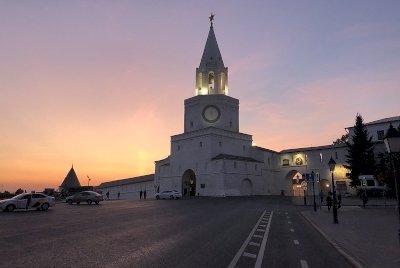
Kazan had been on my travel radar for quite a few years, so I knew I had to make a southern detour there during my Russia-by-Rail trip. Not only is it a mini-hotspot with 3 WHS within easy reach, but it is also the capital of the Federal Republic of Tatarstan (which sounds kind of exotic). In reality, it is a modern, Russified city. It is very clean and I liked that every car stopped in front of zebra crossings when a pedestrian approached! I stayed for 3 days and started my explorations with the oldest Tartar fortress that still exists in Russia: the Kazan Kremlin.
From the Kazan railway station, it is only a 20-minute walk to the Kremlin. It is not difficult to find the fortress: there are signposts everywhere, also in English. Kazan was one of the host cities of the Football World Cup last year, and they have retained an international touch. This year they organized the World Skills Games: an international competition among young artisans, from gardeners to tilers. The logos of these Games, which ended in late August, can still be seen everywhere in the city.
Just like the Kremlin in Moscow, the Kremlin in Kazan is the place where you will find the important and oldest buildings in the city. The slightly leaning, brick Söyembikä tower for example. The President of Tatarstan lives in the green palace next door. Federal republics like Tatarstan have their own constitution, and their own president …
Keep reading 0 comments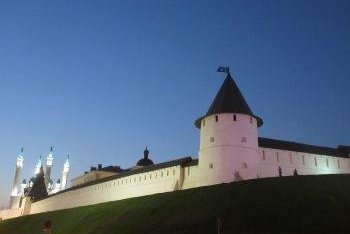
Reading other people's reviews of Kazan Kremlin I was wandering whether we visited the same place or everything changed so much in the last few years. I bet the latter as Russia indeed improved significantly and became more tourist friendly, making my third visit to that country the most enjoyable.
Kazan Kremlin is located in the very center of the city, in a short walk from the train station. Its white walls are visible from a long distance and that view is really pleasant. On the top of some towers there are metal flags with UNESCO signs.
The kremlin was built by tzar Ivan the Terrible after vanquishing of the whole Kazan Khanate and a complete destruction of Kazan. To commemorate the victory he ordered to build a magnificent Sobor Blagoveshchenski, which until recently was the biggest building in Kremlin. The sobor was a symbol of Christian Orthodox victory over Islam. Entry is free of charge, taking pictures forbidden.
But history is sometimes very tricky. In 2005 a beautiful mosque Kul Sharif was built in the centre of the Kremlin. Now the mosque is reigning on the Kremlin, especially at night, and shows renaissance of Islam in this region. Although the building is controversial, I liked it and think it composes well with other buildings of the Kremlin. It is possible to visit and to take photos in the mosque. Other important buildings are Soyembika Tower and Tatarstan president palace.
Entry to Kazan kremlin is free 24h and to praise …
Keep reading 0 comments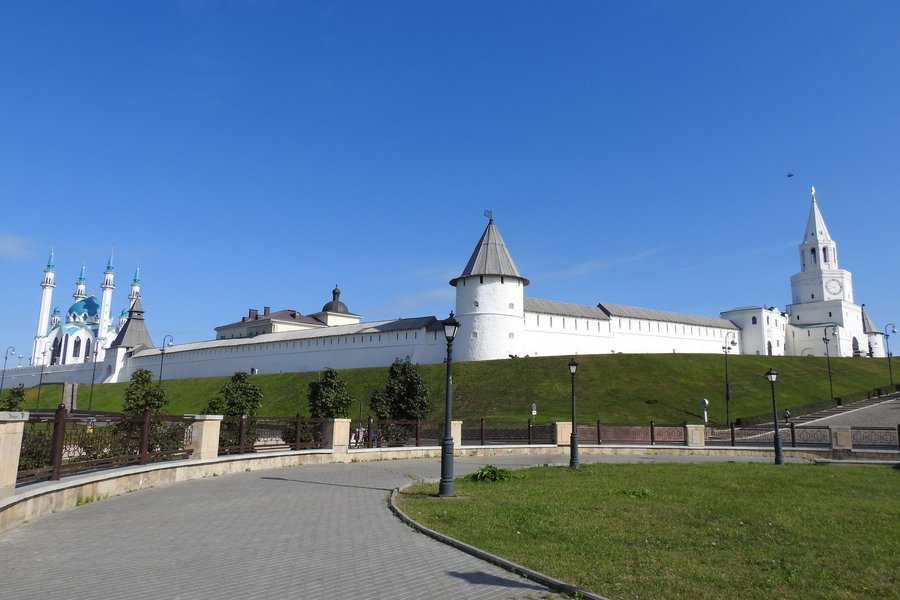
I went to the Kazan Kremlin on 1st September 2011. To be honest it was quite disappointing. The sun was shining and everything looked beautiful, but somehow the experience didn't live up to my expectations. For a city that boasts of its milennium status I for one could not embrace the concept that white walls were anywhere near 1000 years old, and it look like my suspicions are proved right by other posts.
Whilst it was fascinating to step inside a mosque I found it an unsatisfactory experience. The glitzy finish of what is an oversized empty room didn't bring me any closer to God, but left me feeling like an intruder as we wore our blue plastic overshoes and were only permitted access to a viewing gallery.
Imagine taking a trip to St.Pauls Cathedral in London and being told you were only welcome in a small part? Unlike my many trips inside cathedrals there was no evidence of faith through the acts of mere mortals within, but rather a thought that one was supposed to have a sense of awe, which I sadly didn't share.
The mosque was a disappointment, but inside the Kremlin Orthodox Church I was actually assaulted by the security guard! There's no doubt the painting inside were impressive, but as a first time visitor I was quietly discussing what was going on at the rear of building. A qualified priest appeared to be traing a lay man on thart of "incantation". All of a sudden …
Keep reading 0 comments
I may agree with the above stated. It may be a violation of a heritage structure and my first impression was negative. But when I saw that I had to change my opinion. There are some remnants of Tatar Khan graveyards close to Siusiumbike (so we can treat that as continuity of Tatar reign) but I would treat the mosque as underlining new tendencies of Tatar Republic. The mosque is built in the style of modern Central Asia mosques but as a whole it not violating the whole structure. In fact it is the most fascinating part of the whole Kremlin.
Keep reading 0 comments
It is very questionable how legitimate are the criteria of Kazan Kremlin inscription in the World heritage list. The true story is that in 1552 the Tatar fortress was completely destroyed by the Russians. No single monument or structure on the territory of Kazan Kremlin survived the invasion. The new fortress was built from scratch. That is why there is no way we can talk either of the "historical continuity and cultural diversity over a long period of time" or "the historic citadel represents an exceptional testimony of the Khanate period and is the only surviving Tatar fortress". Kazan Kremlin has been a piece of Russian Architecture until 2005 when a new Kul Sharif Mosque was finished. This fact itself is a violation of the World heritage site regulations. 5 years after the site was enlisted an entirely new object was built. It is claimed to be a "restoration" of the historic mosque that had been there before the Russian invasion, but no images or descriptions could be presented to prove the historcal or architectural links between the old and the new mosque.
Keep reading 0 comments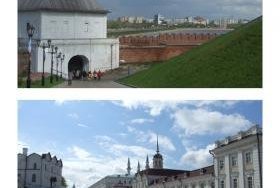
Kazan had long figured large in my city “do list” ever since, over 40 years ago, I first saw Eisenstein’s “Ivan the Terrible” with its magnificent representation of the city’s siege and the defeat of the Tatar Khans. Of course the Kremlin ensemble, built and rebuilt since the siege, can only faintly echo these events but, when we eventually visited in May 2007, we discovered plenty of interest (and controversy) there. Whilst, beyond, lies a handsome city whose style and substance should place it ahead of many other similar-sized European cities (population 1 million +) for a visitor’s attention.
The Kremlin surrounding wall is capped in parts with wooden roofs and spires – several of which, perhaps incongruously and certainly un-authentically, sport the UNESCO WH logo (photo 1) – Kazan is clearly proud of its inscription! Inside is a melange of buildings, both religious and secular, from 16th to 21st (!) century – including 17th century towers, a 16th century cathedral and monastery buildings (other churches were destroyed in Stalin’s time and the monastery became a tobacco factory), a 19th century Governor’s house (still used as the presidential palace) and finally THAT mosque opened as recently as June 2005 (5 years after inscription)! All are joined by a long avenue faced by other classical buildings (photo 2). A fine plan of the complex with “mouse-overs” is on the Tatar President's Web site!
The previous post raises a number of issues regarding the authenticity of the Kremlin and the words …
Keep reading 0 comments
